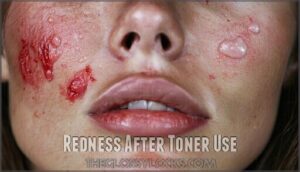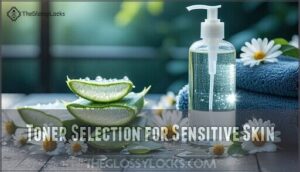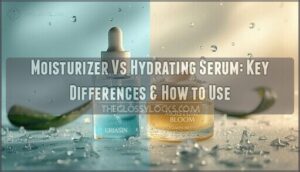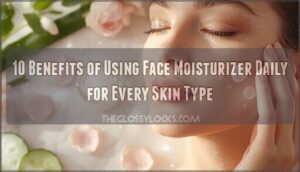This site is supported by our readers. We may earn a commission, at no cost to you, if you purchase through links.

No, it’s not – a burning sensation is a sign that something’s off.
If you’re feeling stinging or pain, it may be due to sensitive skin, harsh ingredients, or incorrect usage.
A good toner should leave your skin feeling refreshed and balanced.
If you’re experiencing burning, you’ll want to identify the cause and make adjustments to your skincare routine.
Now, let’s explore what might be causing that burning sensation and how you can fix it to get the glowing skin you deserve, with the right approach to achieve healthy skin.
Table Of Contents
- Key Takeaways
- Is Toner Supposed to Burn?
- What Causes Toner Burning?
- Symptoms of Toner Burning
- How to Get Rid of Toner Burns
- Redness After Toner Use
- Desired Skin Feel After Toner Use
- How Toners Work
- Usage Guidelines
- Toner Selection for Sensitive Skin
- Recommended Toners for Sensitive Skin
- Frequently Asked Questions (FAQs)
- Does toner burn?
- Does toner burn or sting your skin?
- Is toner bad for your skin?
- Does a toner sting when applied?
- Does the ordinary face Toner burn?
- Why do face toners burn the skin?
- Are toners supposed to sting?
- How do you know if toner is bad for your skin?
- How should your face feel after toner?
- Why does my hair toner burn?
- Conclusion
Key Takeaways
- You shouldn’t feel burning or stinging when you use a toner – it’s a sign that something’s off, and you need to adjust your skincare routine.
- If you’re experiencing burning, it’s likely due to sensitivity to ingredients like alcohol, fragrances, or facial acids, so you’ll want to switch to a gentler toner.
- A good toner should leave your skin feeling refreshed, balanced, and clean, without any irritation or discomfort – so don’t settle for anything less.
- When choosing a toner, look for gentle, moisturizing ingredients like hyaluronic acid, aloe vera, or chamomile, and avoid harsh chemicals that can strip your skin’s natural barrier and cause burning.
Is Toner Supposed to Burn?
Toner shouldn’t burn your skin – that stinging sensation isn’t normal and signals something’s wrong. Your skin’s natural pH balance gets disrupted when harsh alcohol content meets sensitive areas, creating unwanted toner irritation.
Skip the sting—your skin deserves toner that soothes, not burns.
Think of proper toner sensations like a gentle wake-up call, not a fire alarm. Modern toner evolution has moved away from those harsh, alcohol-heavy formulas that made our grandmothers wince. Today’s toners should feel invigorating and clean.
Ingredient compatibility matters more than you’d think. If you’re wondering "is toner supposed to burn?" the answer’s crystal clear – absolutely not. Facial toner burning or persistent toner stinging means it’s time to switch products.
Your skin deserves better than that toner burning sensation. Quality toners balance, hydrate, and prepare your face for the next skincare steps without causing discomfort or irritation.
What Causes Toner Burning?
Several factors can cause your toner to burn, including sensitivity to ingredients like alcohol or fragrances, high concentrations of acids, and allergic reactions to preservatives or dyes.
Your skin deserves comfort, not combat—burning toner signals it’s time to switch to gentler formulations.
You might also experience burning from overusing acidic products or applying toner incorrectly, such as using too much or storing it improperly.
Sensitivity to Ingredients
Recognizing ingredient allergies helps prevent toner burning sensation and skin irritation.
Your skin’s sensitivity stems from specific components that trigger uncomfortable reactions:
- Fragrance sensitivity – synthetic scents cause redness and stinging
- Preservative reactions – chemicals like parabens irritate delicate skin
- Alcohol intolerance – strips natural oils, creating dryness
- Acid sensitivity – disrupts your skin’s protective barrier
Choose sensitive skin toner formulas carefully.
High Concentration of Acids
Chemical peels and glycolic acid toner products pack serious punch.
When acids hit sensitive skin at high concentrations, you’re looking at potential chemical burn risk and acid over-exfoliation.
Safe acid levels start low—think 5-10% for beginners.
If your skin toner burn persists, try neutralizing acids with water or switch to acidic toner alternatives with gentler formulations.
Allergic Reaction
Sometimes your skin throws a curveball, and that burning sensation signals a toner allergy.
Allergic reactions happen when your immune system mistakes ingredients for threats.
Skin sensitivity varies person to person, making allergen identification tricky.
Here’s what triggers skin allergies:
- Synthetic fragrances and dyes
- Preservatives like parabens or formaldehyde
- Chemical compounds in certain formulations
Patch testing helps identify ingredient sensitivity before full application.
Overuse of Acidic Products
Using acidic toners too often creates a damaged skin barrier through acid over-exfoliation.
High acid concentration levels strip your skin’s natural protection, causing burning sensations and irritation.
When you exceed proper product application frequency, even gentle acids become harsh.
Your skin can’t recover between uses, leading to overexfoliation.
Recovery strategies include reducing frequency and choosing alcohol-free formulas.
Incorrect Usage
Applying toner incorrectly often triggers burning and skin irritation.
Over-application effects include redness and stinging, especially on damp skin.
Poor product storage degrades ingredients, while excessive exfoliation frequency damages your skin barrier.
Skip patch testing, and you’re asking for trouble.
Follow label instructions, store products properly, and don’t overdo it—your skin will thank you for the gentler approach.
Symptoms of Toner Burning
When your toner burns, you’ll notice specific warning signs that your skin is reacting badly to the product.
These symptoms include tingling sensations, burning feelings, and redness that shows your skin needs immediate attention.
Tingling
A tingling sensation from toner often signals your skin’s distress call. This mild stinging typically indicates ingredient sensitivity or overuse.
- Ingredient sensitivity: Fragrances or acids trigger tingling causes
- Normal tingling: Brief sensation lasting under two minutes
- Tingling duration: Persistent feelings mean immediate product removal
- Managing tingling: Switch to alcohol-free formulas for skin irritation relief
Toners with beneficial natural ingredients can help soothe irritated skin.
Burning
When your face feels like it’s on fire after applying toner, that’s your skin barrier crying for help.
This burning sensation isn’t normal and signals potential toner side effects from harsh ingredients or allergic reactions.
Burning causes include high acid concentrations or damaged skin barriers.
Stop using the product immediately and consider patch testing toner alternatives before trying again.
Medical consultation may be necessary if the issue persists, as it could indicate a serious allergic reaction.
Redness
Red, angry skin after toner use signals skin irritation or an inflammatory reaction.
Your skin barrier might be reacting to harsh toner ingredients like alcohol or acids.
This skin reaction isn’t normal and often accompanies burning sensations. Sensitive skin types are especially prone to this response.
For redness relief, immediately stop using the product and switch to gentler, redness causes-free formulas.
How to Get Rid of Toner Burns
If you’re dealing with burning from your toner, you’ll want to take action right away to calm your skin and prevent further damage.
The good news is that most toner burns can be treated at home with simple steps, though you may need to switch products or change how you use them.
Stop Using Toner
When your skin screams "help" from burning toner, it’s time to Ditch the Toner immediately.
Stop all use to prevent further irritation and protect your skin barrier health.
This burning sensation isn’t normal skincare behavior.
Give your skin permission to heal by embracing simplified skincare temporarily.
Consider hydration alternatives while investigating what triggered this reaction before selecting gentler options.
Rinse Face With Water
When your toner causes a burning sensation, immediately rinse your face with cool water.
Here’s how to properly handle this skin reaction:
- Use cool water temperature to avoid further skin irritation
- Rinse gently without scrubbing to prevent additional damage
- Remove all product residue from your face and neck area
- Pat dry softly with a clean towel
- Apply gentle moisturizer for hydration benefits
The instructions provided are designed to help mitigate the burning sensation caused by the toner and promote skin recovery.
Change Brands or Types
After rinsing, switching to a different brand often solves burning problems.
Look for ingredient alternatives like alcohol-free formulas designed for sensitive skin. Formulation differences between brands can dramatically reduce skin irritation.
Exploring options for toner for sensitive skin can be beneficial.
Research brand reputation and verify the skin type match is right for you.
Consider product testing with patch tests before full application to prevent future skin reactions.
Use Higher SPF or Lower PH
Finding gentler alternatives helps your skin heal from burning and stinging. Lower pH products reduce irritation and redness while maintaining skin sensitivity balance.
Many users find lower pH toners beneficial for sensitive skin.
- Choose pH-balanced toners (5-7 range) to match your skin’s natural acid mantle
- Select lower acid strength formulas to minimize skin irritation
- Look for SPF benefits in daytime toners for sun damage protection
- Prioritize gentle ingredients over harsh actives until healing occurs
Avoiding Alcohol-Based Toners
Alcohol in toner acts like sandpaper on your face—harsh and unnecessary.
Choose alcohol-free alternatives that respect your skin barrier instead. Natural alternatives with gentle formulas provide hydration focus without the sting.
| Alcohol-Free Ingredients | Benefits for Sensitive Skin | Hydration Level |
|---|---|---|
| Witch Hazel | Reduces inflammation | Medium |
| Hyaluronic Acid | Locks in moisture | High |
| Aloe Vera | Soothes irritation | Medium |
| Rose Water | Calms redness | Low |
| Chamomile Extract | Anti-inflammatory | Low |
Ingredient research shows these toner for sensitive skin options won’t burn.
Redness After Toner Use
If you notice redness on your skin after using toner, you’re experiencing irritation that signals something isn’t right with your product or application method.
This red, inflamed appearance typically happens when your toner contains too much alcohol, high acid levels, or ingredients that don’t work well with your skin type.
Irritation or Inflammation
Red, angry skin after using toner signals inflammation or irritation.
Your skin’s basically throwing a tantrum because something isn’t agreeing with it. This burning, stinging, or tingling reaction means your barrier needs protection.
Inflammation Causes that trigger skin sensitivity:
- Harsh ingredients overwhelming delicate facial tissue
- Weakened skin barrier from over-exfoliation or damage
- Chemical reactions causing visible redness and discomfort
- Wrong product choice for your specific skin type
High Acidity, Alcohol, or Irritants
Why does your skin turn red after using toner?
High acid concentration and alcohol content are common culprits behind burning, stinging, and tingling sensations.
Your irritant sensitivity plays a role too, and ingredient interactions can create unexpected formulation effects that trigger irritation.
Alcohol-based toners strip natural oils, while acidic formulas disrupt pH balance, and these harsh ingredients basically wage war against your skin’s protective barrier, leaving you with unwanted redness.
Consulting a Dermatologist
When persistent burning, stinging, or tingling won’t quit after ditching your toner, a dermatologist becomes your skin’s best friend.
Their expertise transforms confusion into clarity through:
- Skin condition diagnosis – pinpointing exactly what’s causing your irritation
- Treatment options – offering prescription toners or specialized solutions
- Professional guidance – creating personalized routines that actually work
- Follow-up care – monitoring your progress until skin feels normal again.
They can also recommend a sensitive skin routine for daily use.
Desired Skin Feel After Toner Use
When you use the right toner for your skin type, you should feel clean and refreshed without any burning or stinging.
Your skin should feel soft, balanced, and ready for the next steps in your skincare routine.
Clean and Refreshed
After applying the right toner, you’ll experience refreshing sensation and skin revitalization that feels amazing.
Quality toners provide toner benefits through effective impurity removal, leaving your complexion genuinely clean.
Unlike products causing burning, stinging, or tingling from skin sensitivity, proper formulas create balanced skin without irritation.
Your face should feel fresh, comfortable, and perfectly prepped for moisturizer.
Conditioned and Pampered
Your skin should feel like it’s been given a spa treatment after toner application.
Proper Toner Revitalization creates a Gentle Conditioning effect that pampers without burning or irritation.
Quality toners provide:
- Skin Pampering through nourishing botanicals
- Hydration Boost from moisture-binding ingredients
- Texture Refinement for silky-smooth results.
This luxurious feeling confirms your toner isn’t causing skin sensitivity issues.
Softer and Smoother
Your skin texture improves dramatically with proper toner use.
Quality toners provide gentle exfoliation while boosting hydration levels, making skin feel like velvet.
Unlike products that cause burning or irritation, good toners enhance product absorption and deliver long-term benefits.
You’ll notice softer skin that’s smooth to touch.
Skin irritation reduction happens when you choose alcohol-free formulas designed for comfort.
Clearer and Brighter
Beyond softer texture, quality toners deliver clearer and brighter results through gentle exfoliation and spot reduction.
They help diminish hyperpigmentation while providing a radiance boost for even skin tone.
One option is to think about homemade skin toners for a natural glow.
However, if your toner causes burning, redness, or irritation, it’s working against these goals.
The right product brightens without inflammation, leaving you with naturally luminous, clear skin.
Balanced and Hydrated
After achieving a clearer complexion, your skin should reach perfect equilibrium.
Hydrating toner maintains pH balance while boosting hydration levels. Quality toner ingredients strengthen your skin barrier for better moisture retention.
Remember, toner shouldn’t cause burning or irritation—that signals trouble. When your skin feels neither oily nor tight, you’ve found the sweet spot of balanced hydration.
How Toners Work
When you apply toner to your face, it works by removing leftover dirt, makeup, and dead skin cells that your cleanser missed.
The toner’s mild ingredients penetrate your skin to unclog pores and balance your skin’s natural pH levels, preparing it to better absorb the moisturizers and serums you’ll use next.
Mild Ingredients
Gentle ingredients form the backbone of effective toners that won’t leave your skin screaming for mercy.
These mild components work without causing burning or irritation, making them perfect for daily use.
- Plant-based toners with chamomile and aloe vera provide soothing benefits
- Humectant content like hyaluronic acid delivers moisture without stinging
- Antioxidant benefits from vitamin E protect while remaining gentle on skin
Penetrating The Skin
When toner touches your skin, dermal absorption begins immediately.
The molecular size of ingredients determines how deeply they penetrate your skin barrier.
Quality toners use enhanced penetration technology to deliver active ingredients without causing irritation.
If your toner burns during this process, it’s penetrating too aggressively.
Proper ingredient delivery should feel gentle, not painful or uncomfortable, and utilize proper ingredient delivery.
Removing Dirt and Dead Cells
Once your toner penetrates the skin, it gets to work removing dirt and dead cells that regular cleansing might miss.
This deep skin cleansing process prevents burning and irritation by keeping pores clear. Think of it as your skin’s daily housekeeping routine.
Here’s how toners tackle impurity removal:
- Lift away surface debris and pollution
- Remove dead skin cells through gentle cell turnover
- Clear out makeup residue stuck in pores
- Balance your skin’s natural pH levels
- Prepare skin for better product absorption
This pore cleansing action improves skin texture without harsh exfoliation methods, promoting a process of gentle cell turnover and helping to clear out makeup residue for better product absorption.
Unclogging Pores
After removing dirt and dead cells, toners excel at unclogging pores through deep cleansing action.
They penetrate your skin to dissolve oil buildup and prevent blackhead formation.
However, is toner supposed to burn during this process? No – proper pore cleansing shouldn’t cause burning or irritation.
| Pore Benefits | Safety Notes |
|---|---|
| Oil control | No burning sensation |
| Blackhead removal | Gentle exfoliation methods |
| Deep cleansing | Avoid harsh irritation |
Facial Acids for Exfoliation
Many toners contain facial acids like glycolic or salicylic acid for effective exfoliation.
These chemical peel alternatives remove dead skin cells without harsh scrubbing. Start with lower acid concentrations and limit exfoliation frequency to avoid burning or irritation.
Acidic toner benefits include smoother texture and clearer pores. BHAs clear pores by penetrating the skin to fight acne.
Always follow post-exfoliation care with moisturizer and sunscreen.
Usage Guidelines
You’ll get the best results from your toner when you use it correctly and consistently.
Apply toner daily after cleansing, using clean cotton pads or spray bottles to cover your face and neck evenly.
Daily Use
Building up your daily toner routine takes some getting used to, but consistency pays off. Your skin adapts to regular application frequency, and you’ll notice smoother texture over time.
- Morning ritual: Start each day feeling fresh and confident
- Evening comfort: Wind down knowing you’re caring for yourself
- Gradual progress: Watch your skin improve week by week
- Self-care moment: Take a peaceful pause in your busy day
- Routine satisfaction: Feel accomplished maintaining healthy habits
Daily exfoliation through toner layering helps remove dead skin cells. Proper routine integration means using alcohol-free formulas to prevent burning and irritation. Long-term effects include balanced pH and improved skincare absorption.
Applying After Cleansing
Always apply your toner immediately after cleansing to maximize its effectiveness.
This Application Method guarantees proper Residue Removal from your cleanser while your pores remain open.
Pat the toner gently onto damp skin using clean fingertips or a cotton pad.
This timing enhances Absorption Enhancement and prevents burning or irritation.
The Cleansing Importance lies in creating the perfect canvas for your skincare routine’s success.
Using Cotton Pads or Sprays
After cleansing, you’ve got two solid application methods for toner.
Cotton pads work great for targeted application – choose soft Pad Material and use gentle Application Pressure to avoid irritation.
Spray toners offer convenience but mind your Spray Distance (6-8 inches) to prevent burning sensations.
Both methods guarantee Even Distribution while minimizing Product Waste compared to pouring directly onto hands.
Toner Selection for Sensitive Skin
If you have sensitive skin, choose toners with gentle, moisturizing ingredients like hyaluronic acid, aloe vera, or chamomile instead of harsh chemicals.
Look for alcohol-free formulas that won’t strip your skin’s natural barrier, and always patch test new products before applying them to your entire face.
Moisturizing Ingredients
Sensitive skin needs gentle care when choosing a toner.
Look for moisturizing ingredients that won’t cause burning or irritation. The right ingredient combinations can transform your skincare routine from painful to pleasant.
Key moisturizing ingredients to seek:
- Hyaluronic acid – Provides humectant benefits by drawing moisture to skin
- Glycerin – Offers excellent emollient properties for smoothness
- Aloe vera – Natural moisturizers that calm inflamed skin
- Ceramides – Act as occlusive agents to lock in hydration
- Vitamin E – Protects while moisturizing damaged skin barriers
Facial Acids for Acne
When acne’s got you down, facial acids in toners can be game-changers.
Salicylic acid toner penetrates deep, while glycolic and lactic acids tackle surface issues.
Start slow with these powerhouse ingredients – your skin sensitivity matters more than acne severity.
Overdo it, and you’ll trade breakouts for burning.
Build tolerance gradually for long-term effects without the drama.
Reducing Sun Damage
Toners with vitamin C, niacinamide, or green tea help repair existing sun damage while preventing future harm.
These antioxidant-rich formulas work alongside your sunscreen application routine.
However, toners alone won’t shield you from UV rays.
You’ll still need protective clothing, limiting exposure during peak hours, and proper hydration importance for complete sun protection and healthier skin recovery.
Recommended Toners for Sensitive Skin
When you have sensitive skin, choosing the right toner can prevent burning and irritation while still giving you clean, balanced skin.
You’ll want to look for toners with gentle, natural ingredients like aloe vera, chamomile, or vitamin E that won’t cause redness or stinging, and provide a soothing effect with gentle ingredients.
Paula’s Choice Skin Recovery
When your skin feels like it’s been through a battle, Paula’s Choice Skin Recovery toner offers gentle relief.
This alcohol-free formula focuses on barrier repair and redness reduction without burning or irritation. Many modern toners include soothing botanical ingredients for sensitive skin.
Key benefits include:
- Key ingredients like antioxidants and ceramides for skin hydration
- Gentle formula that won’t cause stinging or burning
- Proven track record for sensitive skin types
- Superior product comparison results against harsh toners
The Body Shop Vitamin E
When you’re dealing with burning or irritation from harsh toners, The Body Shop Vitamin E toner offers a gentle alternative.
This alcohol-free formula delivers powerful antioxidant effects while supporting skin barrier repair through hydration properties. Ethically sourced ingredients soothe sensitive skin without stinging.
You can even find various related products online. It’s your ticket to comfortable skincare that actually works.
| Feature | Benefit | Why It Matters |
|---|---|---|
| Vitamin E benefits | Powerful antioxidant protection | Shields skin from environmental damage |
| Alcohol-free formula | No burning or stinging | Safe for sensitive, irritated skin |
| Hydration properties | Deep moisture retention | Strengthens compromised skin barriers |
| Ethical sourcing | Sustainable ingredients | Peace of mind with purchase |
| Gentle formulation | Reduces irritation risk | Perfect for toner-sensitive users |
The combination of these features makes The Body Shop Vitamin E toner an excellent choice for those seeking a gentle and effective skincare solution. With its unique blend of hydration properties and ethically sourced ingredients, it provides a comprehensive approach to skin care.
The Body Shop Aloe Vera
Consider The Body Shop Aloe Vera toner for your sensitive skin routine.
This gentle formula features aloe vera’s natural Aloe Benefits through careful Ingredient Analysis to guarantee Skin Compatibility.
The Product Line emphasizes Ethical Sourcing while delivering a toner that won’t cause irritation.
You’ll notice softer, balanced skin with daily use, making it perfect for delicate complexions seeking gentle hydration.
Frequently Asked Questions (FAQs)
Does toner burn?
You’ll be relieved to know that toner shouldn’t burn, as it’s designed to gently cleanse and balance your skin, not cause irritation or discomfort, so discontinue use if it does.
Does toner burn or sting your skin?
You shouldn’t feel burning or stinging from toner, it’s a sign of sensitivity or irritation, so discontinue use if it happens to you.
Is toner bad for your skin?
You shouldn’t worry, toner isn’t inherently bad for your skin, it’s actually meant to help balance and clean your skin when used correctly.
Does a toner sting when applied?
You might feel a slight sting from toner, especially if it contains alcohol or acids, but it shouldn’t be painful or burning, so discontinue use if that happens.
Does the ordinary face Toner burn?
You’ll be glad to know The Ordinary face toner shouldn’t burn, as it’s formulated to be gentle, but patch testing is still a good idea to confirm your skin agrees.
Why do face toners burn the skin?
You may experience burning from face toners due to sensitivity to ingredients like alcohol, fragrances, or facial acids, which can irritate your skin.
Are toners supposed to sting?
Like a wake-up call for your skin, toners shouldn’t sting, you should feel refreshed, not irritated, so choose gentle ingredients that suit your skin type to avoid any discomfort.
How do you know if toner is bad for your skin?
You know if toner is bad for your skin if it causes burning, stinging, redness, or irritation, indicating a need to discontinue use and find a gentler product.
How should your face feel after toner?
You should feel clean, refreshed, and conditioned after toner, with softer, smoother skin, and a balanced pH, setting your skin up for the next skincare steps.
Why does my hair toner burn?
You’re not alone in this hair-raising experience, as some toners can burn due to sensitivity or high chemical content, so discontinue use and consult a professional for a gentler alternative.
Conclusion
Cut to the chase, you’ve learned that no, toner isn’t supposed to burn.
If you’re wondering "is toner supposed to burn", remember it’s a sign something’s off.
You can fix it by adjusting your skincare routine, and finding a gentle toner that leaves your skin feeling refreshed, not burned.
- https://www.healthline.com/health/whats-so-important-about-skin-ph
- https://www.medicalnewstoday.com/articles/glycolic-acid-for-skin
- https://www.target.com/c/face-toners-cleansers-skin-care-beauty/sensitive-skin/-/N-69lc8Zg58je
- https://www.allure.com/story/toners-for-sensitive-skin
- https://curology.com/blog/how-to-choose-the-best-toner-for-your-sensitive-skin/
















